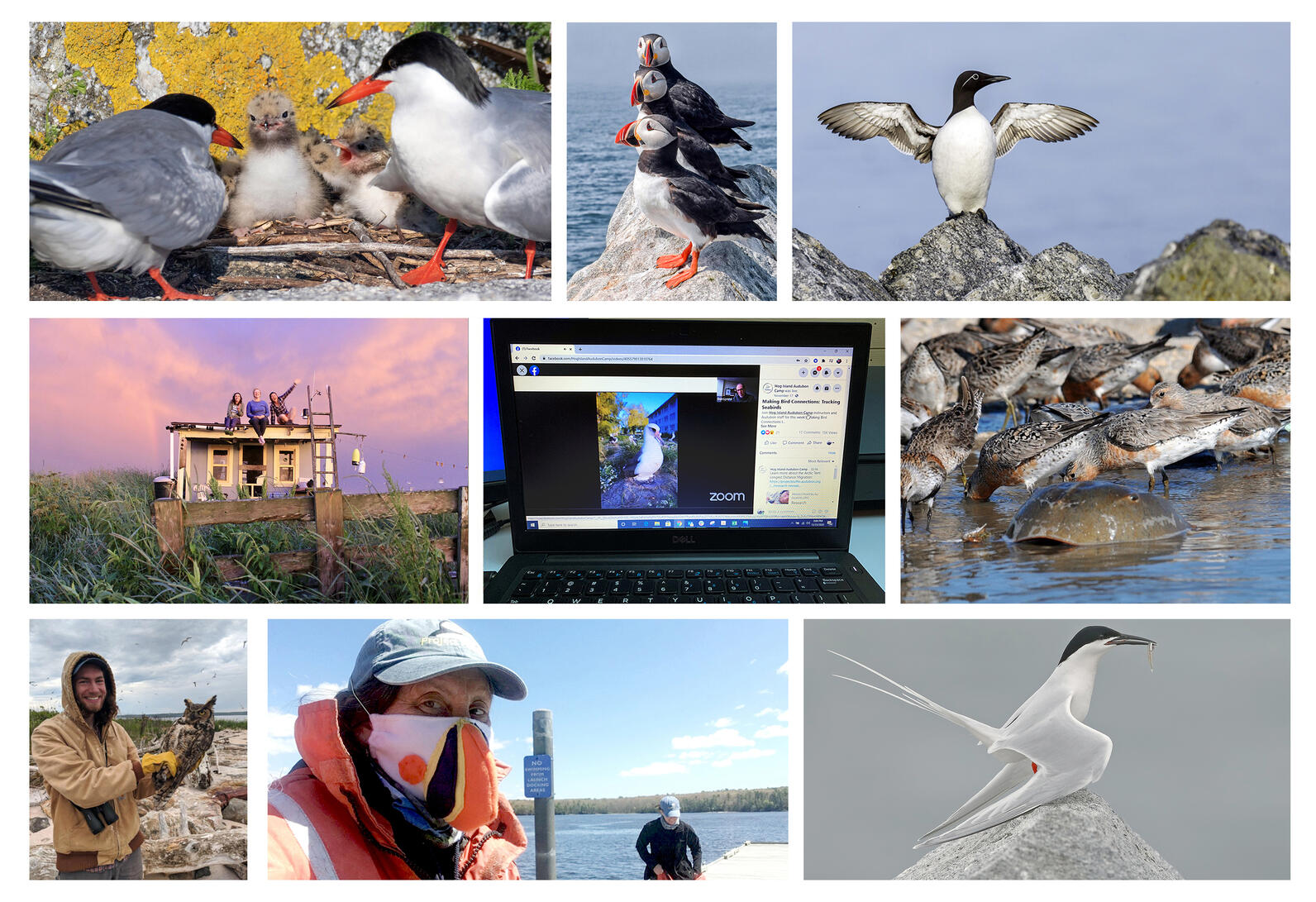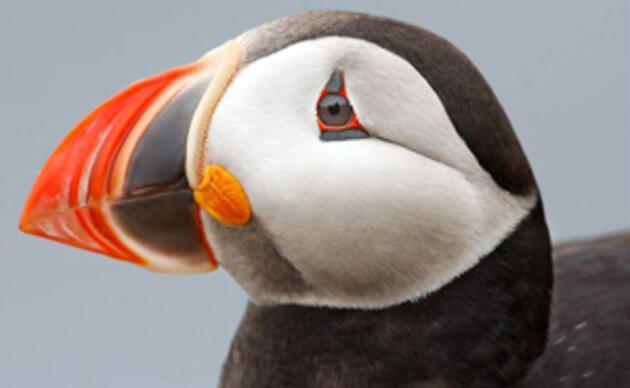Our 2020 Work: Distanced, But Not Distracted

In a year rife with challenges, we have worked hard to continue protecting seabirds, advocating for policies that keep them and their resources safe, all while connecting bird-lovers to our work in the midst of social distancing. The determination and flexibility of our advocates, partners, program participants, researchers, volunteers and seabird lovers across the country and around the world have allowed us to accomplish great things in 2020. Thank you all for doing your part!
We protected our seabirds in the midst of a pandemic.
In the face of unprecedented restrictions due to COVID-19, we isolated small research teams on our seabird-nesting islands to carry out our highest priority work. The importance of our presence there was underscored when upon their COVID-delayed arrival our teams found eagles, owls and a female mallard– a newly recorded predator of tern eggs - making their presence felt. We quickly mitigated for the pressure from these predators and our seabirds ultimately had a strong season in 2020. A new record number of Razorbill nests was recorded on Seal Island NWR, Common Tern pairs rebounded on Eastern Egg Rock, and numbers of Common Murre hatchlings continued their steady climb at Matinicus Rock. We applaud the dedication and flexibility of our research staff, whose hard work safeguarding our seabird colonies is so vital.
Earlier in the spring, we went to work in Virginia when South Island, the former home of Virginia’s largest seabird colony, was paved over as part of the Hampton Roads Bridge Tunnel expansion. Facing pressure from Audubon and other conservation partners, Virginia Governor Ralph Northam made a commitment to protect migratory birds and address the adverse effects of this project. We advised the state on appropriate habitat preparations and social attraction techniques to divert the colony to nearby Fort Wool, and our team manufactured decoys and sound playback systems to support the effort. Our work addressed an immediate conservation threat and resulted in greater bird protections in Virginia.
We listened to what seabirds tell us about ocean ecosystems.
Ecosystem-based fisheries management, which ensures our seabirds have enough to eat, has been a top priority for the Seabird Institute this year. In a December article published in Marine Ecology Progress Series, we worked with university partners to demonstrate that Atlantic Puffin chick diets can be used to indicate the abundance of haddock and redfish, two important commercially harvested fish species in the Gulf of Maine. This most recent example showing how seabird data can inform fisheries management will continue to advance policies leaving more fish in the sea for avian predators. Read the full article here.
We fought to ensure seabirds have enough to eat.
To protect our seabirds, we must also protect the resources on which they rely. In a crucial win this summer, Atlantic Menhaden, a small fish known as “pogies” to Mainers, are now being managed with predators in mind. The Seabird Institute, alongside other environmental and sport fishing organizations, used its policy and science expertise to advocate that these fish are managed using sophisticated ecosystem models that project how different levels of fishing for menhaden will impact the populations of their predators - based on how much they rely on menhaden for food. This is a victory for seabirds all along the Atlantic coast, for whom menhaden is a vital food source. And in an important legislative step forward, in December the Audubon-supported bipartisan Forage Fish Conservation Act was introduced into the United States Senate with an eye towards possible enactment in the next Congress.
The Seabird Institute also took on a leadership role in the Horseshoe Crab Recovery Coalition in 2020 to support efforts to recover this species, whose eggs are a critical food source to threatened Red Knots and other coastal shorebirds. The Coalition continues to push for adoption of a synthetic replacement (rFC) for Horseshoe Crab blood – used by the biomedical industry to test for the presence of harmful bacteria during the manufacture of medication and other products. Already accepted for use in Europe, Japan, and China, adoption of rFC use in the United States could boost crab populations and make more eggs available for migrating shorebirds.
We connected our work with bird lovers around the world.
For only the third time in Hog Island Audubon Camp’s 84-year history, our doors remained closed this summer. Similarly, we were unable to welcome visitors to the Project Puffin Visitor Center in Rockland. These closures did not deter our staff from developing inspiring and insightful programming for bird enthusiasts of all ages, however. Our online programming, including “Virtual Teen Camp,” “Family Camp-in-a-Box,” and “Puffin Islands Online” reached 260 virtual campers this summer. Additionally, we launched the fall lecture series “Making Bird Connections,” which featured Hog Island and Audubon instructors in a series that had 1,800 registrants and reached tens of thousands of viewers on social media. More avian activities are around the corner. Registration opens soon for our the expanded version of “Puffins Islands Online ,” an online course about the remarkable lives of puffins and other seabirds. “Tern the Page” is a book club for bird enthusiasts across the globe. Readers will dive into four books by Hog Island Camp instructors and be invited to two meetings for each book, including “Meet the Author” sessions. We hope you’ll join us online this winter.
We centralized our operational headquarters in Bremen, Maine.
As our transformation to the Seabird Institute continues, we’ve relocated our central operations to the Todd Wildlife Sanctuary in Bremen, Maine. The Puffin House, former summer residence of Project Puffin Founder, Stephen Kress, is now home of our administrative offices after undergoing renovations this past summer. New faces can also be found within the Puffin House walls. Lindsy Buckland joined the team as Office Coordinator and Kimberly Keller has taken the reins as Development and Communications Associate. A new structure, the Kress Teaching Pavilion and Native Plant Garden, can also been found on the sanctuary’s grounds. With further improvements ongoing, we remain hopeful that we can reopen our doors in Spring 2021.
In the midst of a tumultuous year, thank you for remaining dedicated to our seabirds. Your generosity and help make a difference every day. We can’t wait to have our friends, YOU, back when it is safe to do so.
Learn about birds and take action
Adopt-A-Puffin
Adopt now and receive a Certificate of Adoption, along with a biography of "your" puffin!
Visitor Center
The Project Puffin Visitor Center (PPVC) is located at 311 Main Street in downtown Rockland, Maine. The center opened its doors officially on July 1, 2006.



